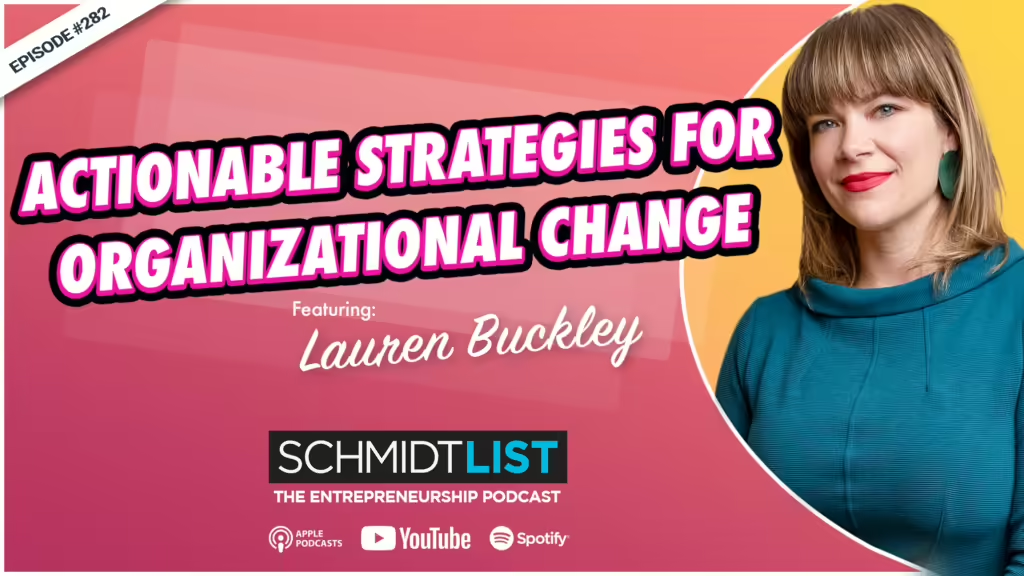Addressing the Human Element for Effective Change Management
In the latest episode of the Schmidt List, host Kurt Schmidt sits down with Lauren Buckley, co-founder of the Hush Collaborative, to unravel the complexities of organizational change, employee engagement, and strategic initiatives. Their discussion sheds light on the often-overlooked human factors that play a critical role in the success or failure of organizational change efforts.
The Stark Reality of Strategic Failures
Early in the conversation, Buckley highlights a shocking statistic: 90% of strategic initiatives fail, and 70% of the subsequent change initiatives also fall short. This staggering failure rate underscores the need for a thorough audit focusing on strategy, systems, and human factors within organizations.
Buckley explains that many leaders tend to focus on short-term goals and technological solutions, missing out on the crucial element of human engagement. This oversight leads to significant wastage and unfulfilled organizational potential.
The Importance of Employee Engagement
One key takeaway from Buckley’s insights is the pivotal role of employee engagement in driving meaningful change. She emphasizes that successful organizational transformation hinges on listening to employees at all levels. When employees feel heard and invested, they are more likely to align with the company’s vision and contribute effectively.
Schmidt adds that leadership alignment is essential for any cultural change. Without leaders fully on board, even the most well-structured change initiatives can falter. Legacy leaders often focus too heavily on quantitative measures, neglecting the qualitative aspects that fuel genuine employee engagement.
Moving Beyond the “Yes Culture”
Buckley provides a compelling example of a project where addressing a “yes culture” led to a 30% reduction in unnecessary work. This shift allowed employees to say “no” to non-productive tasks, creating a work environment focused on meaningful contributions rather than incessant busyness.
According to Buckley, traditional employee engagement scores can be misleading. Organizations should focus on “employee operations” – the effective day-to-day functioning of employees – rather than just their happiness. By honing in on operational efficiency, companies can drive substantial improvements in employee satisfaction and productivity.
Shifting from Culture to Community
A significant portion of the conversation involves the distinction between culture and community within organizations. Buckley argues that building a sense of community – where collective goals and individual contributions are valued – can be more effective than striving for cultural conformity.
She points out that companies are essentially “forced communities,” where diverse individuals work towards shared objectives. By breaking down silos and enhancing collaboration, organizations can leverage their employees’ talents more effectively, fostering a more engaged and cohesive workforce.
Addressing the Real Issues
One of the most common pitfalls in modern workplaces is the number and structure of meetings, which often leave mid-management feeling overworked and underappreciated. According to both Schmidt and Buckley, there is an assumption that all professionals inherently possess skills like communication and collaboration. However, these are learned skills that require ongoing development.
Structuring meetings with clear agendas and decision-making protocols can significantly reduce wasted time and increase productivity. Small changes, rather than extensive overhauls, can often address inefficiencies and improve overall organizational efficiency.
Introducing Hush Collaborative
Lauren Buckley’s organization, the Hush Collaborative, stands out by focusing on truth, transparency, and practical solutions. Unlike large consultancies, Hush Collaborative targets mid-sized companies in the central U.S. and aims to implement impactful yet straightforward changes. By conducting audits from various organizational levels, they align strategic plans with actual, actionable steps.
Their social media handle, @honestforgood, encapsulates their commitment to genuine and effective organizational change. Clients describe working with Hush Collaborative as relieving and therapeutic, a testament to the meaningful impact of their approach.
Lauren Buckley and her business partners, Allie Fendrick and Kate Meehan, are active on LinkedIn and continue to share valuable insights into organizational development. The success stories and significant revenue improvements attributed to Hush Collaborative’s interventions underscore the company’s effective methodology.
Conclusion: Embracing Change for Growth
In essence, this episode of the Schmidt List with Lauren Buckley offers a deep dive into the human elements that drive successful organizational change. By focusing on actionable messaging, breaking down silos, and building a sense of community, organizations can unlock untapped potential and foster a more engaged, productive workforce.
Remember, change is not just about new strategies or technological advancements; it’s about engaging the people who make those changes possible.
Follow:
